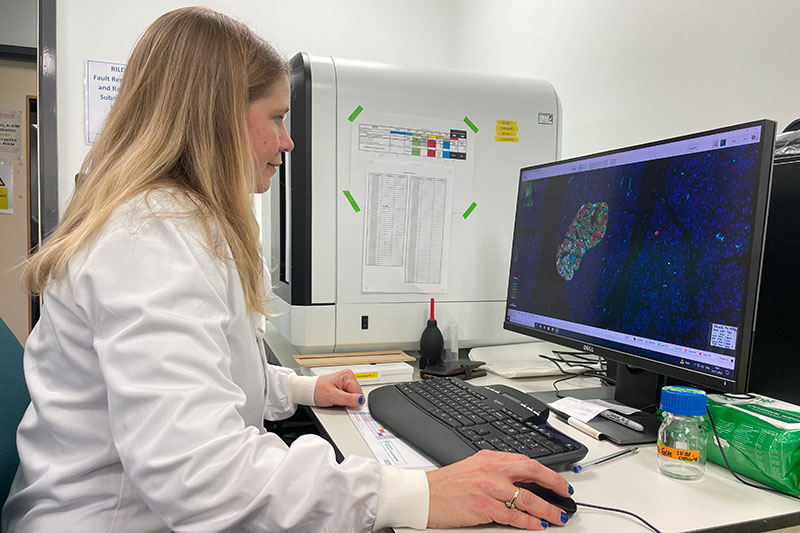Home > News > Type 1 Diabetes Grand Challenge invests £13 million into six transformational new projects
News

We’re thrilled to unveil the latest groundbreaking research projects funded by the Type 1 Diabetes Grand Challenge. Earlier this year, we called on scientists to submit research proposals to get us closer to having new treatments for people with type 1 diabetes that tackle the root cause of their condition and restore their insulin-making beta cells.
Now, over £13 million of funding will support six outstanding research teams – made up of 49 scientists, working at 22 different institutions in the UK and Europe – to fast-track discoveries that could see us make huge strides in how we treat type 1 diabetes.
Helping people make their own insulin
To cure type 1 diabetes, we need to find a way to give people with type 1 diabetes new beta cells that work to precisely control their blood sugar levels. Four of our new projects will innovate new ways of reaching this goal.
Beta cells: replace, protect, regenerate
Professor David Hodson, at University of Oxford, Dr Ildem Akerman, at University of Birmingham, and Dr Johannes Broichhagen, at Leibniz FMP, will lead a team to explore how insulin-boosting molecules that sit on the surface of beta cells could be harnessed to create beta cells in the lab that work better and survive for longer.
They’ll also investigate if the molecules can be used to deliver treatments that help to protect transplanted beta cells from the immune system or trigger new beta cells to grow inside the body, by encouraging other cells in the pancreas to transform into beta cells.
Find out more about the team’s project.
Bolstering beta cells ready for transplantation
Professor Shanta Persaud and Dr Aileen King, at King’s College London, and team will work to create an unlimited supply of elite beta cells ready for transplant. They’ll draw on their expert knowledge in how the human pancreas works and develops, and apply this to making beta cells from stem cells in the lab. As they grow their beta cells, they’ll bolster them with specialised support cells and helpful nutrients that will encourage them to fully develop so they can respond to changing blood sugar levels just as well as real beta cells do.
Find out more about the team’s project.
Creating a better home for transplanted beta cells
Professor Francesca Spagnoli and Dr Rocio Sancho at King’s College London, together with Professor Molly Stevens at University of Oxford, will focus on ways to keep lab-made beta cells safe from harm. They’ll use cutting-edge technology to boost beta cells’ chances of survival once transplanted by coating them with protective gels and using nanoparticle technology to create a synthetic microenvironment to protect them from stress and immune attack.
The team will also develop a transplantation device that beta cells can live inside, to protect them from the hostile environment they’ll face once transplanted inside the body.
Find out more about the team’s project.
Unleashing the benefits of cell transplants
Professor Shareen Forbes, at University of Edinburgh, and Dr Lisa White, at University of Nottingham, will spearhead a team to search for ways to boost the benefits of donor beta cells transplants (called islet transplants). They’ll investigate if delivering drugs packaged inside microcapsules alongside islet transplants helps the donated beta cells produce more insulin and survive for longer. This would make islets transplants more effective and mean many more people with type 1 diabetes could benefit.
Finally, the team will investigate if this approach could be applied to beta cells made from stem cells.
Find out more about the team’s project.
Stopping the immune attack’s harm
In people living with type 1 diabetes, the immune system remains primed to seek out and destroy beta cells. To ensure the survival of any new beta cells transplanted into people with type 1, protection from the immune system is critical. Two projects from our latest multi-million-pound investment are focused on promising new immunotherapy treatments, which fend off the immune attack in type 1 diabetes.
Immunotherapy: is timing everything?
Dr James Pearson, at Cardiff University, and his team will investigate if the time of day when we give an immunotherapy can affect how well it works. They’ll study a type of immunotherapy drug named interleukin-2 (IL-2). It works by expanding the population of helpful immune cells, called regulatory T cells (Tregs), which try to prevent killer immune cells from launching their attack. Dr Pearson has found evidence that Tregs respond differently to IL-2 depending on the time of day and will now explore this further.
The findings could help to improve the effectiveness of a promising immunotherapy for people with and at risk of type 1 diabetes by identifying the best time of day to give the treatment.
Find out more about the team’s project.
Are two immunotherapies better than one?
Dr Danijela Tatovic, at Cardiff University, will head a team to explore if combining two immunotherapies that target different parts of the immune system could make them more effective at protecting beta cells.
They’ll run a clinical trial testing the immunotherapies abatacept and IL-2 with people recently diagnosed with type 1 diabetes, who still have some surviving beta cells. Their findings will tell us how best to combine the drugs and will lay the groundwork for a bigger trial, which could build the evidence needed to make this combination treatment available for people with or at risk of type 1 diabetes.
Find out more about the team’s project.
Dr Elizabeth Robertson, Director of Research at Diabetes UK, said:
“We’re in a hugely exciting period for the Type 1 Diabetes Grand Challenge, as today we welcome six exceptional scientists who will lead exciting multi-disciplinary teams to drive forward this pioneering initiative and build momentum towards our ambitious goal.
“This announcement brings with it fresh hope of a cure for everyone living with type 1 diabetes, and we look forward to seeing how these projects will break new ground in our search for life-changing beta cell therapies and treatments to overcome the type 1 immune system attack.”
Rachel Connor, Director of Research Partnerships at JDRF UK, said:
“Today’s announcement of six newly funded research projects demonstrates the speed and ambition of the Type 1 Diabetes Grand Challenge. All six projects hold great promise for people with type 1 diabetes. We can’t wait to see the results of this vital research to transform beta cell therapy and tackle the immune reaction that is at the root of driving type 1.”
Steve and Sally Morgan, Founders of the Steve Morgan Foundation, said:
“This is an exciting moment in our partnership with Diabetes UK and JDRF UK. We are astounded by the innovation and vision of the new projects and look forward to seeing how the research helps us realise our ambition of transforming the lives of people with type 1 diabetes.”
Our latest awards take the total amount of funding the Type 1 Diabetes Grand Challenge has awarded in 2023 to over £18 million, following the Steve Morgan Foundation’s momentous £50 million pledge. We’ll keep you updated on the progress of this extraordinary research as our growing squad of scientists help us step closer to a cure.



